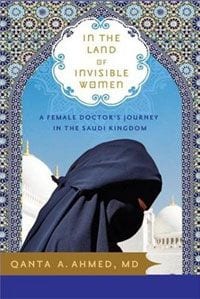
It is during the drive from the airport to her new home and workplace — a militarized compound in Riyadh, Saudi Arabia — that Dr. Qanta Ahmed observes her first cultural puzzle. On the road, she sees traditionally-dressed Bedouin men chatting on cell phones, the rear windows of their luxury sedans tinted to obscure views of the women inside. She notices there are no female drivers; it is against the law. Simultaneously, she spots a jalopy carrying a camel. “The absurd, clamorous clash of modern and medieval — Benz and Bedou, Cadillac and camel — was one which would reverberate throughout my stay in the Kingdom. It never became less arresting to behold”.
Between 1999 and 2001, Ahmed, a British Muslim, served as a doctor in the Intensive Care Unit (ICU) at the National Guard hospital in Riyadh. In the Land of Invisible Women, the story of her tenure, is an engaging tale of identifying and exploring the many mysteries and contradictions of Saudi life. Dr. Ahmed’s honest, heartfelt prose can border on the flowery and overwrought — one less adjective per sentence would do — and her renderings of dialogue are often stilted. These minor squabbles do not undermine the insightfulness of her discoveries and the window they open into a society largely inaccessible to the Western world.
For Ahmed, the most complicated mystery to unravel is the women of Saudi Arabia. Her female colleagues are so fully veiled she can scarcely tell them apart. They rarely proffer medical opinions or challenge the opinions of others. Are these women, as Ahmed first assumes, simply resigned to “mute and unquestioning obedience”?
As Ahmed slowly develops friendships with Saudi women, she learns there is more going on behind their abbayahs (long robes with headscarfs) than meets the eye. Women who were adults before 1979 — the year the royal family and the clergy forged a marriage of convenience and began enacting oppressive laws — pine for lost freedoms, such as going out in public without their husbands. For professional women of Ahmed’s age (early 30s), religion-based restrictions create painfully complex predicaments. Reem, a talented young surgeon, reminds Ahmed of herself: independent, well-educated, professionally driven. She dreams of becoming a vascular surgeon, and is elated when accepted into a fellowship program in Canada. However, as an unmarried woman, Reem must ask her father for permission to accept the offer. He will grant it only if she is engaged or married. Reem soon becomes engaged and, in the end, never does make it to Canada.
At the same time, there are successful young women like Zubaidah, an ICU nutritionist, who are somehow made stronger by the regulations they face, including the requirement to be veiled in public. Although Ahmed personally dislikes veiling, even she finds herself understanding its appeal. Upon seeing Zubaidah for the first time sans veil, Ahmed says, “Momentarily, I was jealous at how she caged her beauty, sharing it only with the few … Briefly, I wished I had treated my own looks with such gravity … instead of giving myself away, daily, wasteful, indiscriminately”. The surprises for Ahmed do not stop there. At a private party with Zubaidah’s stylish, well-coiffed friends, the women relax by passing around a hookah. Ahmed also discovers that many run wildly profitable businesses — through men, of course, since women themselves cannot be the owners.
Ahmed experiences her own tests and transformations during her stay in the Kingdom. She is shocked when some of her colleagues celebrate 9/11 by eating cake, and must figure out what to do with her anger. And she is forced to cope with the feeling of vulnerability that washes over her whenever she leaves her home and goes outdoors. These fears are not unfounded. Ahmed has more than one run-in with the Mutaween — feared men who ensure compliance with the Kingdom’s Islam-based rules of behavior. One night, Ahmed attends a welcome dinner for some medical professionals from overseas. Both men and unrelated women are present, a big no-no; the dinner is unceremoniously disrupted by the Mutaween.
There are, in fact, no socially-sanctioned ways for unrelated men and women to meet in Saudi Arabia. This results in desperate measures among single Saudis. In fact, Ahmed herself realizes that e-mail and a carefully-conceived plan for professional collaboration are the only ways for her to become acquainted with an intriguing, accomplished doctor.
Ahmed’s greatest transformation is her relationship with her faith. During her first year, she undertakes Hajj, the Muslim pilgrimage to Mecca. After months of experiencing Saudi Arabia’s uniform, restrictive version of Islam, Ahmed feels at home during the Hajj, where she sees a diversity of Muslims from around the world. “Islam was many-faceted”, she realizes, “I was simply one”.

![Call for Papers: All Things Reconsidered [MUSIC] May-August 2024](https://www.popmatters.com/wp-content/uploads/2024/04/all-things-reconsidered-call-music-may-2024-720x380.jpg)



